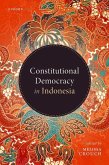Without Trimmings
The Legal, Moral, and Political Philosophy of Matthew Kramer
Herausgeber: McBride, Mark; Kurki, Visa Aj
Without Trimmings
The Legal, Moral, and Political Philosophy of Matthew Kramer
Herausgeber: McBride, Mark; Kurki, Visa Aj
- Gebundenes Buch
- Merkliste
- Auf die Merkliste
- Bewerten Bewerten
- Teilen
- Produkt teilen
- Produkterinnerung
- Produkterinnerung
Professor Matthew Kramer is one of the most important legal philosophers of our time. This collection of essays brings together esteemed philosophers and junior scholars, to critically assess Kramer's philosophy. The contributions focus on Kramer's work on legal philosophy, metaethics, normative ethics, and political philosophy.
Andere Kunden interessierten sich auch für
![Constitutional Democracy in Indonesia Constitutional Democracy in Indonesia]() Constitutional Democracy in Indonesia142,99 €
Constitutional Democracy in Indonesia142,99 €![Taxing Profit in a Global Economy Taxing Profit in a Global Economy]() Michael P. Devereux (Director of the Oxford University Centre for BTaxing Profit in a Global Economy45,99 €
Michael P. Devereux (Director of the Oxford University Centre for BTaxing Profit in a Global Economy45,99 €![The Oxford Handbook of Corporate Law and Governance The Oxford Handbook of Corporate Law and Governance]() Jeffrey N. Gordon (Richard P Richard Paul Richman Professor of LawThe Oxford Handbook of Corporate Law and Governance75,99 €
Jeffrey N. Gordon (Richard P Richard Paul Richman Professor of LawThe Oxford Handbook of Corporate Law and Governance75,99 €![A Global Labour Law A Global Labour Law]() Adalberto PerulliA Global Labour Law148,99 €
Adalberto PerulliA Global Labour Law148,99 €![International Anti-Money Laundering and Soft Law International Anti-Money Laundering and Soft Law]() Emmanuel EbikakeInternational Anti-Money Laundering and Soft Law43,99 €
Emmanuel EbikakeInternational Anti-Money Laundering and Soft Law43,99 €![International Anti-Money Laundering and Soft Law International Anti-Money Laundering and Soft Law]() Emmanuel EbikakeInternational Anti-Money Laundering and Soft Law159,99 €
Emmanuel EbikakeInternational Anti-Money Laundering and Soft Law159,99 €![Illicit Finance and the Law in the Commonwealth Caribbean Illicit Finance and the Law in the Commonwealth Caribbean]() Rohan D. Clarke (Independent anti-money laundering consultant and JIllicit Finance and the Law in the Commonwealth Caribbean183,99 €
Rohan D. Clarke (Independent anti-money laundering consultant and JIllicit Finance and the Law in the Commonwealth Caribbean183,99 €-
-
-
Professor Matthew Kramer is one of the most important legal philosophers of our time. This collection of essays brings together esteemed philosophers and junior scholars, to critically assess Kramer's philosophy. The contributions focus on Kramer's work on legal philosophy, metaethics, normative ethics, and political philosophy.
Hinweis: Dieser Artikel kann nur an eine deutsche Lieferadresse ausgeliefert werden.
Hinweis: Dieser Artikel kann nur an eine deutsche Lieferadresse ausgeliefert werden.
Produktdetails
- Produktdetails
- Verlag: Oxford University Press
- Seitenzahl: 624
- Erscheinungstermin: 17. August 2022
- Englisch
- Abmessung: 244mm x 162mm x 45mm
- Gewicht: 1084g
- ISBN-13: 9780198868866
- ISBN-10: 0198868863
- Artikelnr.: 66168656
- Herstellerkennzeichnung
- Libri GmbH
- Europaallee 1
- 36244 Bad Hersfeld
- gpsr@libri.de
- Verlag: Oxford University Press
- Seitenzahl: 624
- Erscheinungstermin: 17. August 2022
- Englisch
- Abmessung: 244mm x 162mm x 45mm
- Gewicht: 1084g
- ISBN-13: 9780198868866
- ISBN-10: 0198868863
- Artikelnr.: 66168656
- Herstellerkennzeichnung
- Libri GmbH
- Europaallee 1
- 36244 Bad Hersfeld
- gpsr@libri.de
Dr Mark McBride is a British and Irish legal scholar and philosopher, and currently an Assistant Professor at the Law Faculty of the National University of Singapore. His active research interests include legal philosophy and epistemology. His work has appeared in publications such as the American Journal of Jurisprudence, the Canadian Journal of Law & Jurisprudence, Legal Theory, and Episteme. Recently, he has articulated the core of his tracking theory of rights in Analytic Philosophy - a theory which he is developing at length in a forthcoming book, The Tracking Theory of Rights. Dr Visa AJ Kurki is Associate Professor of Jurisprudence at the Law Faculty of the University of Helsinki. His research interests include rights theory, legal personhood, and animal law. His monograph A Theory of Legal Personhood was published by Oxford University Press in 2019 and described as "an instant classic" in the Modern Law Review. His work has also appeared in journals such as the Oxford Journal of Legal Studies, Legal Theory and the German Law Journal.
* I. RIGHTS AND RIGHT- HOLDING
* 1: Laura K. Donohue: Correlation and Constitutional Rights
* 2: Rowan Cruft: Rights, Positivism, and the Vice of Self-Puffery: Why
Kramer's Interest Theory is Nearly Right
* 3: Joseph Bowen: The Interest Theory of Rights at the Margins:
Posthumous Rights
* 4: Visa A.J. Kurki: Are Legal Positivism and the Interest Theory of
Rights Compatible?
* 5: Mark McBride: Tracking the Resilience of Hybridity
* II. GENERAL JURISPRUDENCE
* 6: Brian H. Bix: Objectivity, Conventions, and the Possibility of
Universal Error
* 7: Wilfrid J. Waluchow: and Inclusive Legal Positivism: Dancing on
the Head of a Pin?
* 8: Pierluigi Chiassoni: Kramer's Theory of Legal Positivism: Merits
and Demerits
* 9: Gerald J. Postema: Law's Existence to Law's Rule: Reflections on
Kramer's Understanding of the Rule of Law
* III. GENERAL MAT TERS OF ETHICS
* 10: Christine Tiefensee: Metasemantics, Moral Realism, and Moral
Doctrines
* 11: Lubomira Radoilska: Distinguishing Value-Neutrality from
Value-Independence: Toward a New Disentangling Strategy for Moral
Epistemology
* 12: Michael Garnett: Prevention, Coercion, and Two Concepts of
Negative Liberty
* V. LIBERALISM
* 14: Mark R. Reiff: Neutrality and Excellence
* 15: Collis Tahzib: Does Edificatory Perfectionism Express a Quidnunc
Mentality?
* VI. APPLIED ETHICS
* 16: R.A. Duff: Punishment and the Importance of Perspective
* 17: Christopher Kutz: Kramer's Razor and the Freedom of Expression
* REPLIES
* 18: Matthew H. Kramer: Looking Back and Looking Ahead: Replies to the
Contributors
* 1: Laura K. Donohue: Correlation and Constitutional Rights
* 2: Rowan Cruft: Rights, Positivism, and the Vice of Self-Puffery: Why
Kramer's Interest Theory is Nearly Right
* 3: Joseph Bowen: The Interest Theory of Rights at the Margins:
Posthumous Rights
* 4: Visa A.J. Kurki: Are Legal Positivism and the Interest Theory of
Rights Compatible?
* 5: Mark McBride: Tracking the Resilience of Hybridity
* II. GENERAL JURISPRUDENCE
* 6: Brian H. Bix: Objectivity, Conventions, and the Possibility of
Universal Error
* 7: Wilfrid J. Waluchow: and Inclusive Legal Positivism: Dancing on
the Head of a Pin?
* 8: Pierluigi Chiassoni: Kramer's Theory of Legal Positivism: Merits
and Demerits
* 9: Gerald J. Postema: Law's Existence to Law's Rule: Reflections on
Kramer's Understanding of the Rule of Law
* III. GENERAL MAT TERS OF ETHICS
* 10: Christine Tiefensee: Metasemantics, Moral Realism, and Moral
Doctrines
* 11: Lubomira Radoilska: Distinguishing Value-Neutrality from
Value-Independence: Toward a New Disentangling Strategy for Moral
Epistemology
* 12: Michael Garnett: Prevention, Coercion, and Two Concepts of
Negative Liberty
* V. LIBERALISM
* 14: Mark R. Reiff: Neutrality and Excellence
* 15: Collis Tahzib: Does Edificatory Perfectionism Express a Quidnunc
Mentality?
* VI. APPLIED ETHICS
* 16: R.A. Duff: Punishment and the Importance of Perspective
* 17: Christopher Kutz: Kramer's Razor and the Freedom of Expression
* REPLIES
* 18: Matthew H. Kramer: Looking Back and Looking Ahead: Replies to the
Contributors
* I. RIGHTS AND RIGHT- HOLDING
* 1: Laura K. Donohue: Correlation and Constitutional Rights
* 2: Rowan Cruft: Rights, Positivism, and the Vice of Self-Puffery: Why
Kramer's Interest Theory is Nearly Right
* 3: Joseph Bowen: The Interest Theory of Rights at the Margins:
Posthumous Rights
* 4: Visa A.J. Kurki: Are Legal Positivism and the Interest Theory of
Rights Compatible?
* 5: Mark McBride: Tracking the Resilience of Hybridity
* II. GENERAL JURISPRUDENCE
* 6: Brian H. Bix: Objectivity, Conventions, and the Possibility of
Universal Error
* 7: Wilfrid J. Waluchow: and Inclusive Legal Positivism: Dancing on
the Head of a Pin?
* 8: Pierluigi Chiassoni: Kramer's Theory of Legal Positivism: Merits
and Demerits
* 9: Gerald J. Postema: Law's Existence to Law's Rule: Reflections on
Kramer's Understanding of the Rule of Law
* III. GENERAL MAT TERS OF ETHICS
* 10: Christine Tiefensee: Metasemantics, Moral Realism, and Moral
Doctrines
* 11: Lubomira Radoilska: Distinguishing Value-Neutrality from
Value-Independence: Toward a New Disentangling Strategy for Moral
Epistemology
* 12: Michael Garnett: Prevention, Coercion, and Two Concepts of
Negative Liberty
* V. LIBERALISM
* 14: Mark R. Reiff: Neutrality and Excellence
* 15: Collis Tahzib: Does Edificatory Perfectionism Express a Quidnunc
Mentality?
* VI. APPLIED ETHICS
* 16: R.A. Duff: Punishment and the Importance of Perspective
* 17: Christopher Kutz: Kramer's Razor and the Freedom of Expression
* REPLIES
* 18: Matthew H. Kramer: Looking Back and Looking Ahead: Replies to the
Contributors
* 1: Laura K. Donohue: Correlation and Constitutional Rights
* 2: Rowan Cruft: Rights, Positivism, and the Vice of Self-Puffery: Why
Kramer's Interest Theory is Nearly Right
* 3: Joseph Bowen: The Interest Theory of Rights at the Margins:
Posthumous Rights
* 4: Visa A.J. Kurki: Are Legal Positivism and the Interest Theory of
Rights Compatible?
* 5: Mark McBride: Tracking the Resilience of Hybridity
* II. GENERAL JURISPRUDENCE
* 6: Brian H. Bix: Objectivity, Conventions, and the Possibility of
Universal Error
* 7: Wilfrid J. Waluchow: and Inclusive Legal Positivism: Dancing on
the Head of a Pin?
* 8: Pierluigi Chiassoni: Kramer's Theory of Legal Positivism: Merits
and Demerits
* 9: Gerald J. Postema: Law's Existence to Law's Rule: Reflections on
Kramer's Understanding of the Rule of Law
* III. GENERAL MAT TERS OF ETHICS
* 10: Christine Tiefensee: Metasemantics, Moral Realism, and Moral
Doctrines
* 11: Lubomira Radoilska: Distinguishing Value-Neutrality from
Value-Independence: Toward a New Disentangling Strategy for Moral
Epistemology
* 12: Michael Garnett: Prevention, Coercion, and Two Concepts of
Negative Liberty
* V. LIBERALISM
* 14: Mark R. Reiff: Neutrality and Excellence
* 15: Collis Tahzib: Does Edificatory Perfectionism Express a Quidnunc
Mentality?
* VI. APPLIED ETHICS
* 16: R.A. Duff: Punishment and the Importance of Perspective
* 17: Christopher Kutz: Kramer's Razor and the Freedom of Expression
* REPLIES
* 18: Matthew H. Kramer: Looking Back and Looking Ahead: Replies to the
Contributors








